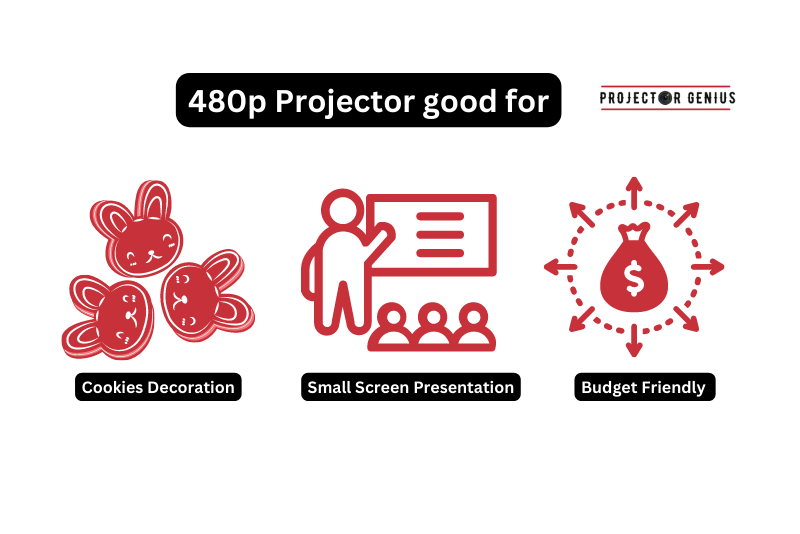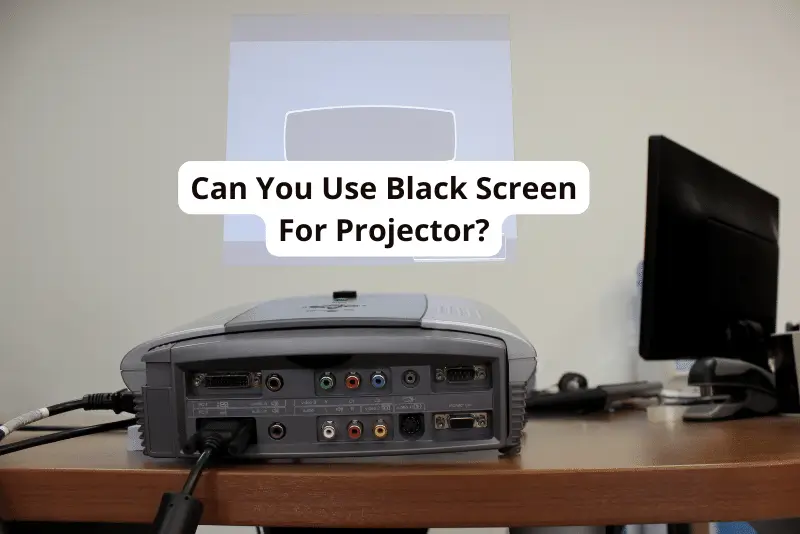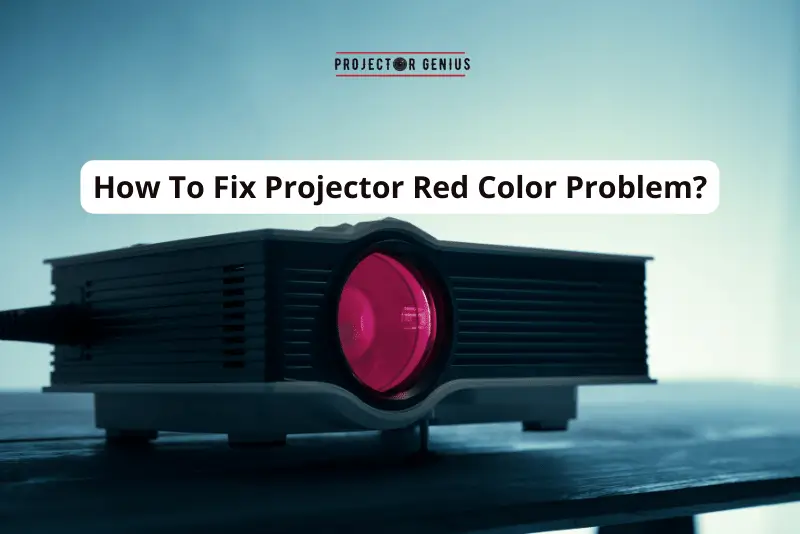Is 480p Projector Worth It?
-
 Written by:
Kristy Roger
Written by:
Kristy Roger
- Last Updated:
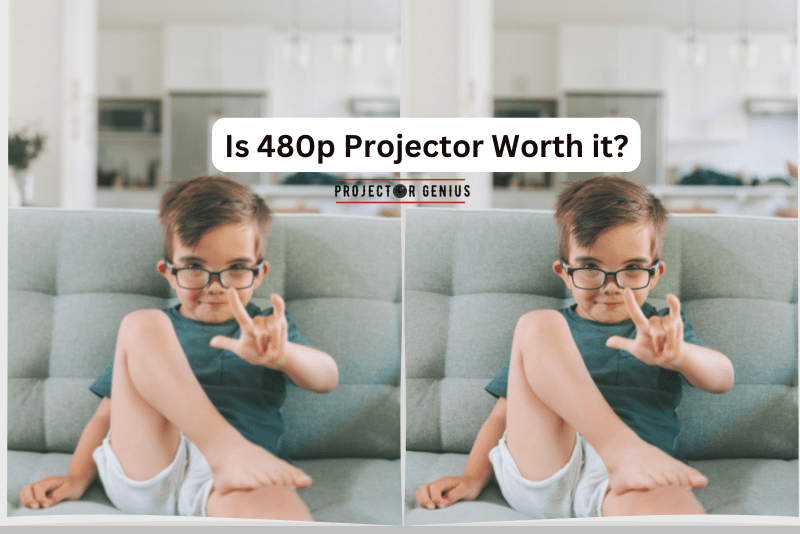
So you are wondering is 480p Projector Worth It! And you’ve come to the right place.
Choosing the best is difficult, I know! Fortunately, I’ve spent several years researching and studying projector video production and have managed to narrow it down for you.
During this time, I’ve had hands-on experience with hundreds of different projector types. Let’s dive into the pros and cons to help you decide: Is a 480p Projector Worth It?
I’ll also help you decide which Resolution works best for you.
Is a 480p projector worth it? A 480p projector can be worth it for basic video needs or if you’re on a tight budget. However, for a more immersive and higher-quality viewing experience, especially for movies and gaming, it’s advisable to invest in a higher-resolution projector like 720p or 1080p for better clarity and detail.
I recommend using the Table of Contents to quickly access the information you need.
My article is designed to cater to home cinema users of all levels, from Beginners to Advanced enthusiasts.
Table of Contents
What is a 480p Projector?
A 480p projector is an older type of projector that displays images and videos at a resolution of 640×480 pixels. This resolution is considered standard definition, which means it has fewer pixels compared to modern high-definition displays. The image is shown all at once in a progressive scan, unlike older interlaced displays.
The aspect ratio of a 480p projector is typically 4:3, resulting in a more square-shaped image. This is different from today’s widescreen displays. While these projectors might be suitable for basic presentations or simple video playback, they lack the sharpness and detail of higher-resolution projectors like 1080p or 4K, which offer more pixels and a more immersive viewing experience.
So, whether a 480p projector is worth it depends on your specific needs. If you’re looking for better visual quality for movies or gaming, you might want to consider a projector with a higher resolution.
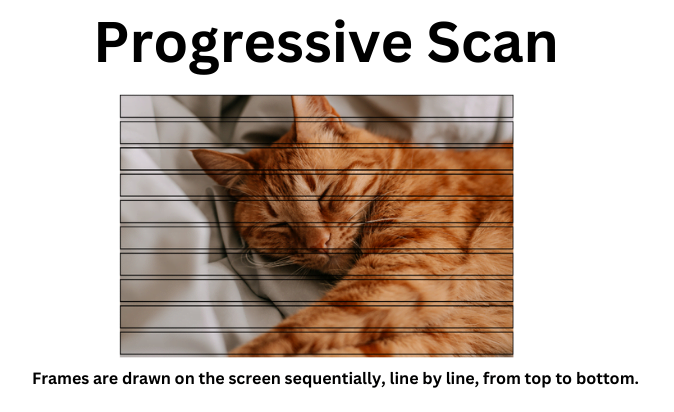
What are the Benefits of Choosing a 480p Projector?
Let’s explore the benefits of choosing a 480p projector:
Cost-Effectiveness
One of the most prominent advantages of a 480p projector is its affordability. If you’re on a budget or have specific needs that don’t demand top-tier visual quality, these projectors offer a wallet-friendly option. They can be perfect for basic presentations, classrooms, or temporary setups where a lower price tag is a priority.
Compatibility
Many older devices and content are optimized for standard definition. If you have a collection of older videos, classic movies, or retro games, a 480p projector can actually do justice to this content. The visuals will appear as intended without any unnecessary upscaling, preserving the original charm.
Smooth Performance
Since the resolution is lower, 480p projectors tend to have less demand for processing power. This can translate into smoother playback of videos and less strain on the projector itself. For instance, if you’re displaying simple charts or graphs during a presentation, a 480p projector can handle it with ease.
Lower Lumens, Less Light
If you’re planning to use the projector in a controlled environment with dim lighting, a 480p projector might be sufficient. They often have lower lumens (brightness measurement) compared to higher-resolution models, which can actually be a good thing in a darker setting.
However, it’s important to note that the benefits of a 480p projector heavily depend on your specific needs. If you’re seeking crystal-clear visuals, cinematic experiences, or detailed gaming, a higher-resolution projector would be a better fit. But if you’re looking for a cost-effective, compatibility-driven option for simpler use cases, a 480p projector might just be the unexpected gem you’ve been looking for.
What are the Limitations of Choosing a 480p Projector?
Opting for a 480p projector comes with its fair share of limitations that are important to consider. Let’s break down these constraints in a conversational manner:
Limited Resolution
The most significant drawback of a 480p projector is its limited resolution. With just 640×480 pixels, the level of detail and sharpness in the images and videos you project is notably lower compared to modern standards.
Visual Clarity
Due to the lower pixel count, you might notice a lack of visual clarity, especially when projecting larger images or videos. Details might appear a bit fuzzy or less defined.
Screen Size Impact
If you plan to project on larger screens or in bigger rooms, the limitations of a 480p projector become more apparent. The images might lose sharpness, making them appear pixelated when blown up.
Aspect Ratio
The aspect ratio of 4:3 can also be a constraint. Most modern content and displays are designed for widescreen aspect ratios, and a 4:3 aspect ratio might result in black bars on the sides when watching widescreen content.
Compatibility
As technology advances, many sources of content—such as streaming services, Blu-ray players, and gaming consoles—offer higher resolutions. A 480p projector might not be fully compatible with these sources, leading to a potential mismatch in quality.
Future-Proofing
Technology is constantly evolving, and investing in a 480p projector might not be the most future-proof choice. Higher-resolution projectors are becoming more affordable, and as content continues to improve, you might find yourself wanting a more advanced projector sooner than you think.
Immersive Experience
If you’re aiming for an immersive experience, such as enjoying movies or gaming, a 480p projector might not provide the level of detail and realism you’re looking for. The visuals might lack the “wow” factor that higher resolutions deliver.
While a 480p projector might serve its purpose for certain basic uses like presentations or casual videos, its limitations become apparent when you’re seeking high-quality visuals, larger screens, or compatibility with modern content sources. It’s essential to weigh these limitations against your needs and expectations to determine if a 480p projector is the right choice for you.
How does 480p Resolution Compare to Higher Resolutions like HD?
Let’s break down how 480p resolution compares to higher resolutions like HD in a concise manner:
480p resolution means there are 640×480 pixels on the screen. It’s the older standard definition norm. In contrast, HD resolutions like 720p (1280×720 pixels) and 1080p (1920×1080 pixels) offer much more detail and clarity.
With 480p, visuals can lack visual clarity and fine details, especially on larger screens. But with HD, images are crisper and more vibrant, making a significant difference when it comes to enjoying content.
Also, consider the aspect ratio: 480p uses a 4:3 aspect ratio, while HD typically goes for a modern 16:9 aspect ratio. This widescreen format enhances the viewing experience, giving you more immersive visuals.
In a nutshell, 480p resolution falls short compared to the detail-rich HD resolutions. The extra pixels in HD make everything look more captivating and enjoyable, whether you’re watching, playing, or simply indulging in media.
If you want to learn more, read my comprehensive comparison of 480p vs 1080p.
Is 480p Projector Worth It?
You’re pondering whether investing in a 480p projector is a smart move. Well, let’s break it down.
First things first, a 480p projector comes with limitations, especially when compared to the higher resolutions we’re accustomed to nowadays. The visual quality might not be up to par, and those subtle details might be a bit lost in the lower resolution.
When we talk about projector resolutions, the game-changer is HD or high-definition. You’ve got 720p and 1080p resolutions offering more pixels, resulting in sharper and more vivid images. So, if you’re looking for an immersive experience, like cinematic movie nights or gaming adventures, a 480p projector might not be your best bet.
Remember, too, the aspect ratio – 480p usually sticks with a more square 4:3 aspect ratio, while modern content and displays lean toward the widescreen 16:9 aspect ratio. This can impact how content appears on the screen and might lead to those pesky black bars.
However, if you’re after something simpler, like presentations, basic videos, or casual content, a 480p projector might still have its charm. It’s a practical choice for scenarios where you don’t need those super-duper sharp visuals.
But here’s the thing: Technology is a fast runner. We’ve got HD, 4K, and who knows what’s next around the corner. The concern is whether a 480p projector is a future-proof investment. As content continues to improve and higher resolutions become more accessible, you might find yourself longing for crisper visuals sooner than you think.
So, is a 480p projector worth it? The answer depends on your needs and expectations. If you’re aiming for high-quality, detailed visuals for movies, gaming, or other media, you might want to consider those snazzy higher-resolution projectors. On the flip side, if your demands are more modest and you’re seeking a budget-friendly option for simpler tasks, a 480p projector could still be your friend.
Is a 480p Projector Suitable for Gaming?
Gaming on a 480p projector – let’s break it down.
480p resolution means you’re looking at 640×480 pixels on the screen. While it might have been okay in the past, modern gaming has moved to HD resolutions like 720p and 1080p for those crisp visuals.
So, here’s the scoop: for graphically demanding games with all the bells and whistles, a 480p projector might not capture the fine details and immersive experience you’re craving. However, if you’re into simpler or retro games, the charm of a 480p projector could actually enhance the nostalgia.
Just remember, while visuals matter, the heart of gaming is the fun and challenge. If you’re all about the gameplay and don’t mind sacrificing a bit of pixel-perfect imagery, a 480p projector could still offer you a great gaming adventure.
Ultimately, it’s about your gaming style and what you’re after – the full visual package or a gaming experience that’s all about the thrill.
Is a 480p Projector Suitable for Home Entertainment?
Let’s discuss whether a 480p projector is a good fit for home entertainment:
Thinking of cozy movie nights or casual gaming with a 480p projector? Here’s the scoop.
With 480p resolution, you’ve got 640×480 pixels. It’s not as sharp as today’s HD resolutions like 720p and 1080p, which offer more vibrant visuals.
For chill movie nights and simple content, a 480p projector could still create a pleasant vibe. It’s like revisiting the cozy feel of older days.
However, if you’re all about immersive, eye-catching visuals that grab your attention, a 480p projector might not provide that cinematic wow factor.
In a nutshell, if you’re seeking a relaxed atmosphere or a touch of nostalgia, a 480p projector could be your go-to. But if top-notch visuals are your thing, you might want to consider stepping up to an HD projector.
Is a 480p Projector Suitable for Presentation?
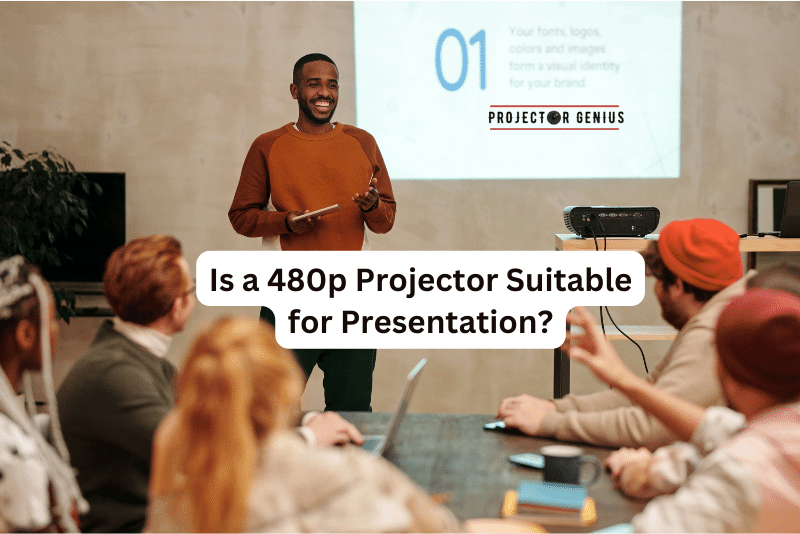
When it comes to presenting content-heavy material, a 480p projector can hold its own. With a resolution of 640×480 pixels, it might not be the sharpest, but for text, simple graphics, and images, it does the job.
Consider the aspect ratio – 480p projectors often stick to a traditional 4:3 aspect ratio, making your slides fit well without much tweaking.
In well-lit rooms, a 480p projector can still deliver a readable presentation. While visuals might not be ultra-crisp, your message will come through clearly.
In a nutshell, for straightforward presentations, a 480p projector is a dependable choice. It might not excel with high-res graphics, but it ensures your content takes center stage.
Can a 480p Projector Display Modern Content Effectively?
Let’s explore whether a 480p projector can effectively display modern content in a concise and friendly way:
Modern content often means high-definition visuals – those eye-catching pixels that make everything pop. However, a 480p projector with its 640×480 resolution falls under standard definition, which might not do justice to the latest movies, TV shows, or graphically intense games.
But hold on! Not all modern content is ultra-detailed. For simpler videos, retro games, or casual photos, a 480p projector can still offer a charming experience.
Just keep in mind, if you’re after the full visual feast of the latest and greatest, you might want to consider a projector with a higher resolution. But if you’re looking for cozy nostalgia or enjoying less intricate content, a 480p projector can still play its part.
Will a 480p Projector Become Outdated Soon?
Technology’s moving fast, and resolution is no exception. A 480p projector with 640×480 pixels was okay in the past, but now we’re all about HD and even 4K resolutions.
For the latest and greatest visuals, a 480p projector might not quite cut it. The limitations become more noticeable as the content gets sharper.
But wait, there’s a twist. If you’re into simpler vibes, nostalgia, or straightforward presentations, a 480p projector still has a role to play.
However, the big concern is future-proofing. As tech evolves, you might find yourself eyeing higher resolutions sooner than you’d expect.
So, while a 480p projector isn’t completely outdated, its limitations might become more apparent as time goes on. If you’re after simplicity, it’s still a contender. But for the cutting-edge experience, those higher resolutions are the way to go.
Final Thoughts
While a 480p projector may have its niche applications, it’s important to recognize its limitations in a world where higher resolutions like HD and 4K dominate.
While it can still serve for simpler content, casual viewing, or basic presentations, its potential obsolescence due to rapid technological advancements and the demand for sharper visuals suggests that investing in higher-resolution projectors might offer a more future-proof and immersive experience, catering to the evolving standards of modern entertainment and multimedia consumption.
Author of this Post:

Kristy Roger
Home Cinema Consultant & Tech Enthusiast
Holding a background in Industrial and Electrical Technology from the University of Alberta, Kristy has spent 5+ years consulting on home theater products at a top electronics firm. As a certified Technical Professional with Lean Six Sigma credentials, Kristy expertise ranges from projector nuances to hands-on experience with leading models. Kristy have been sharing her knowledge online for two years, blending professional insights with personal experiences from her own home cinema setup. Off the screen, She is a dedicated mom to Jerry, Ryan, and our two pups, Cuddle and Paw.

